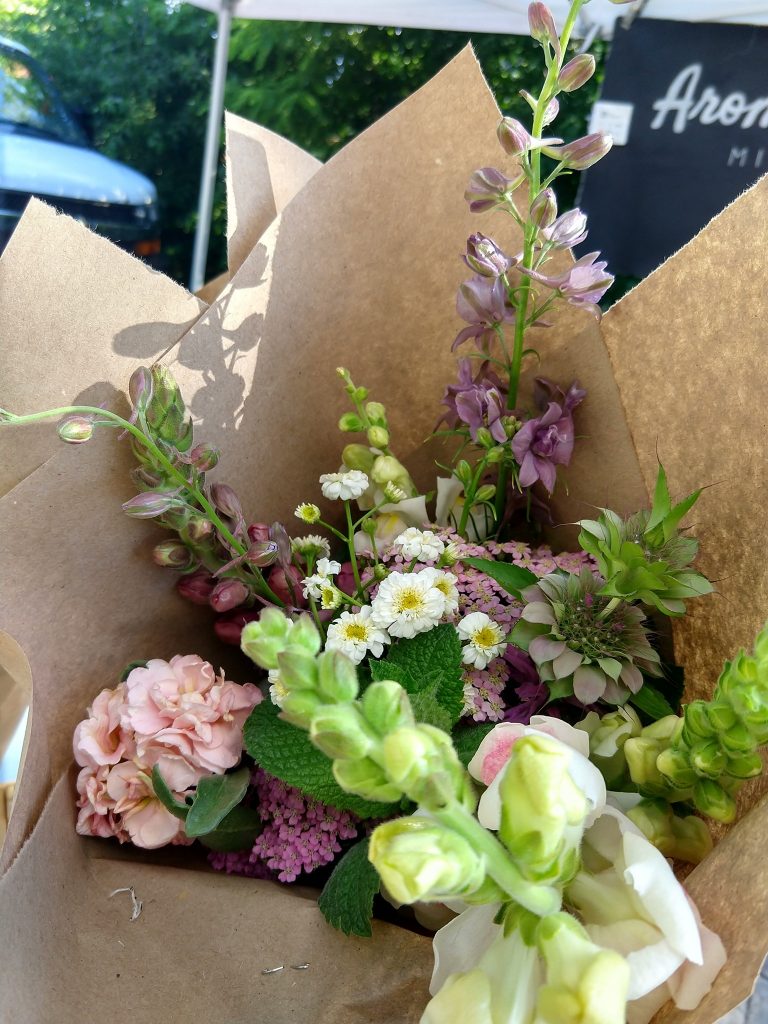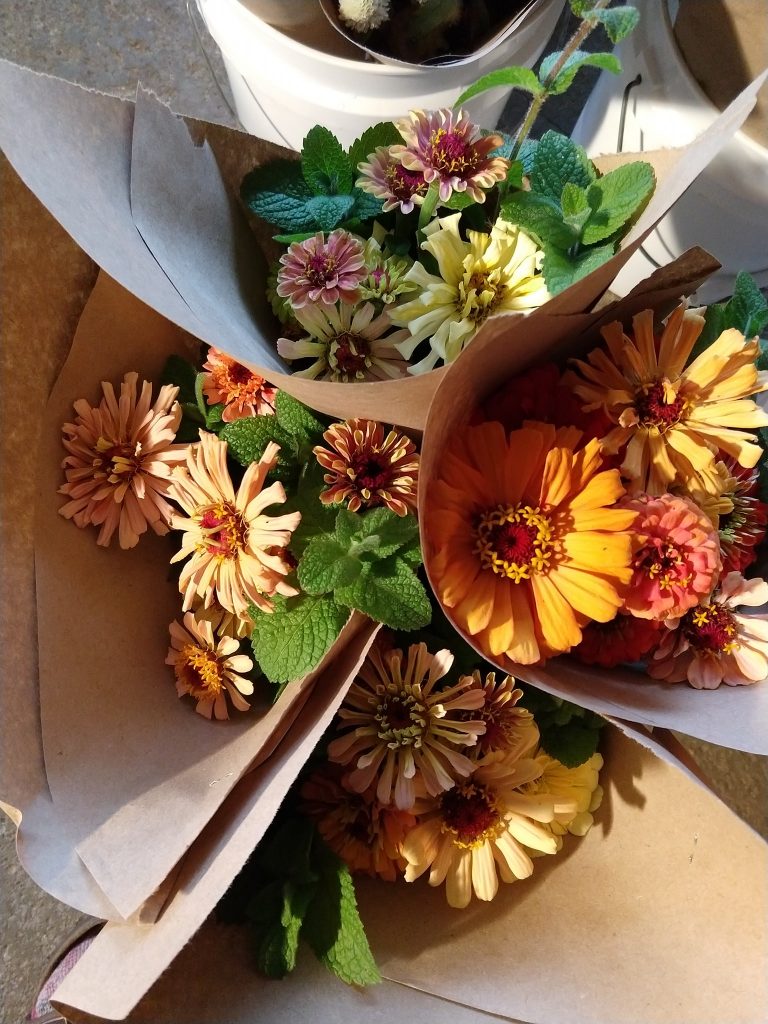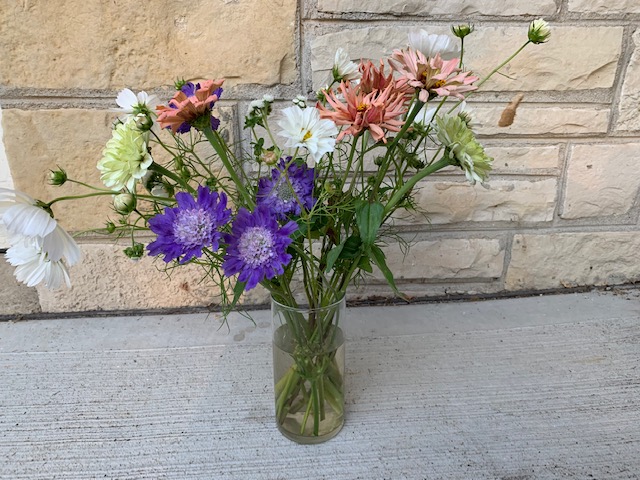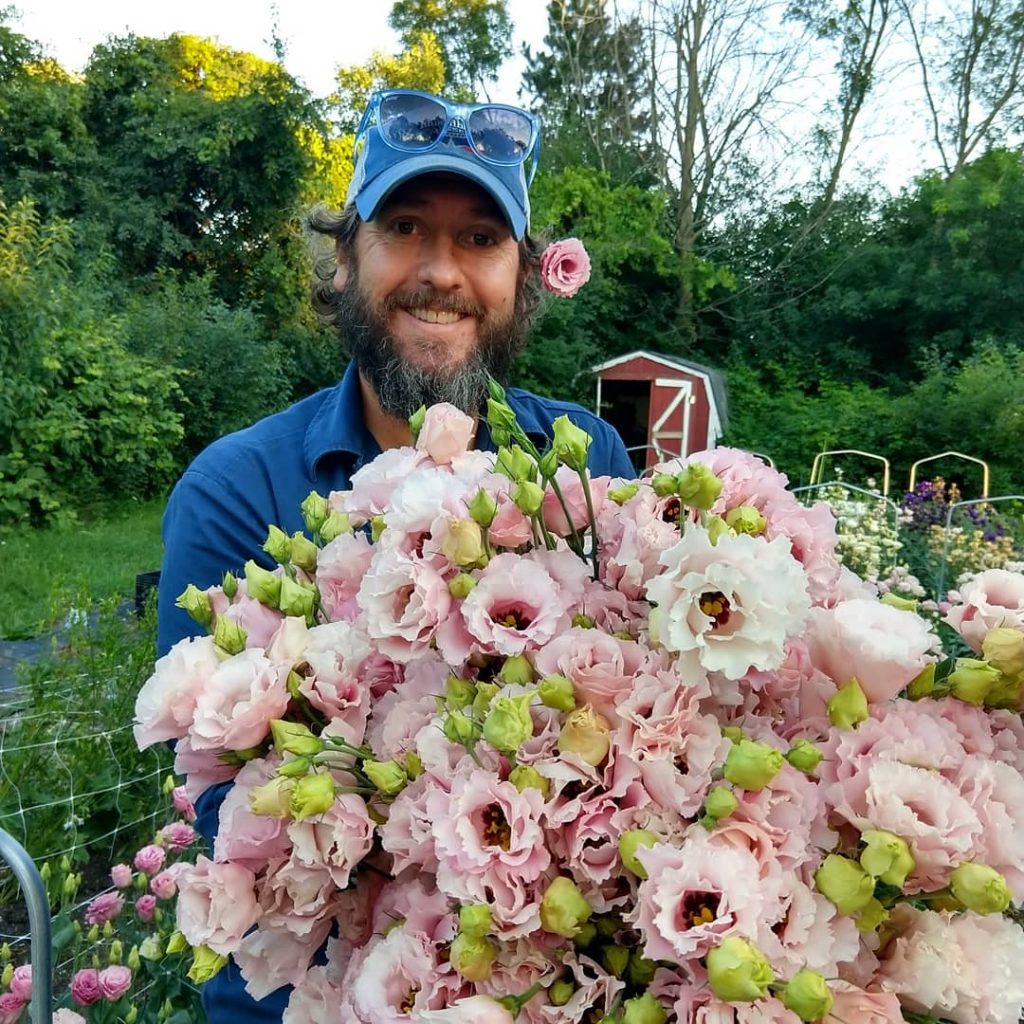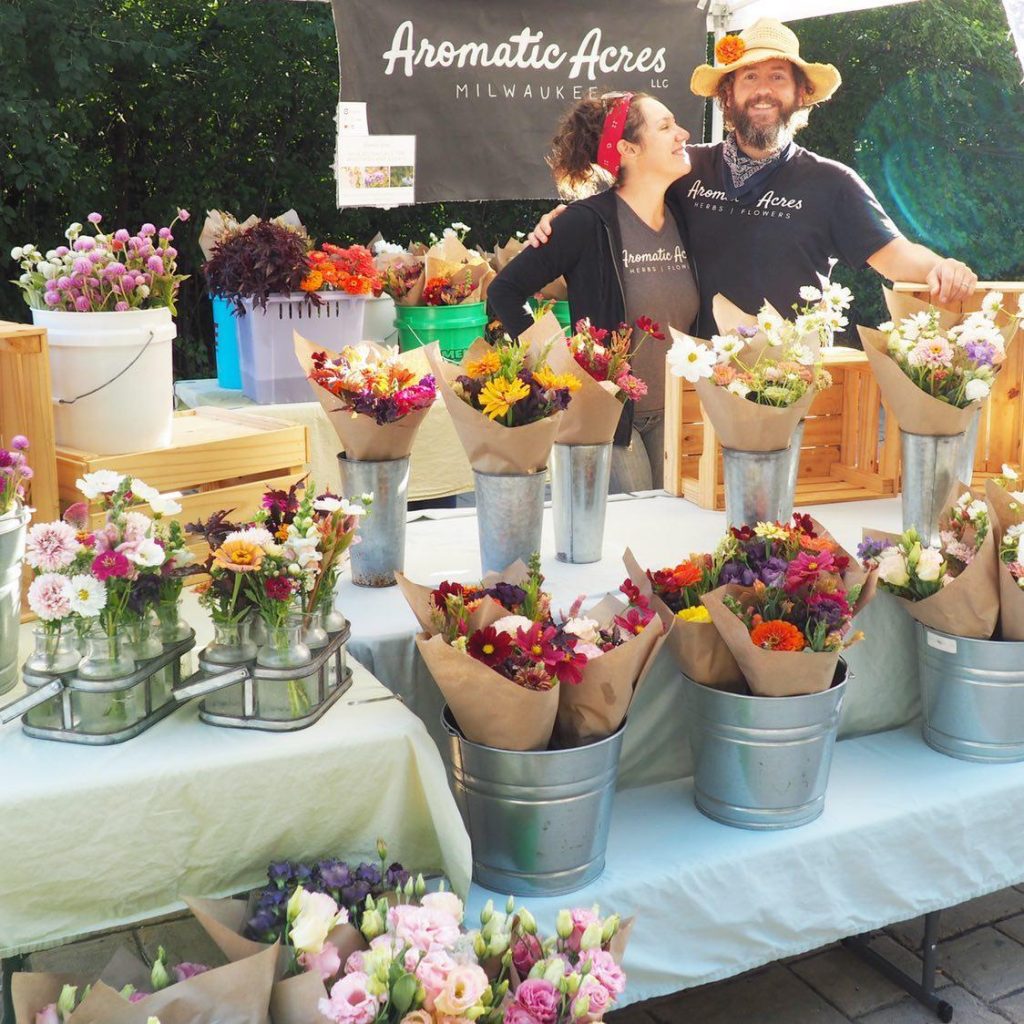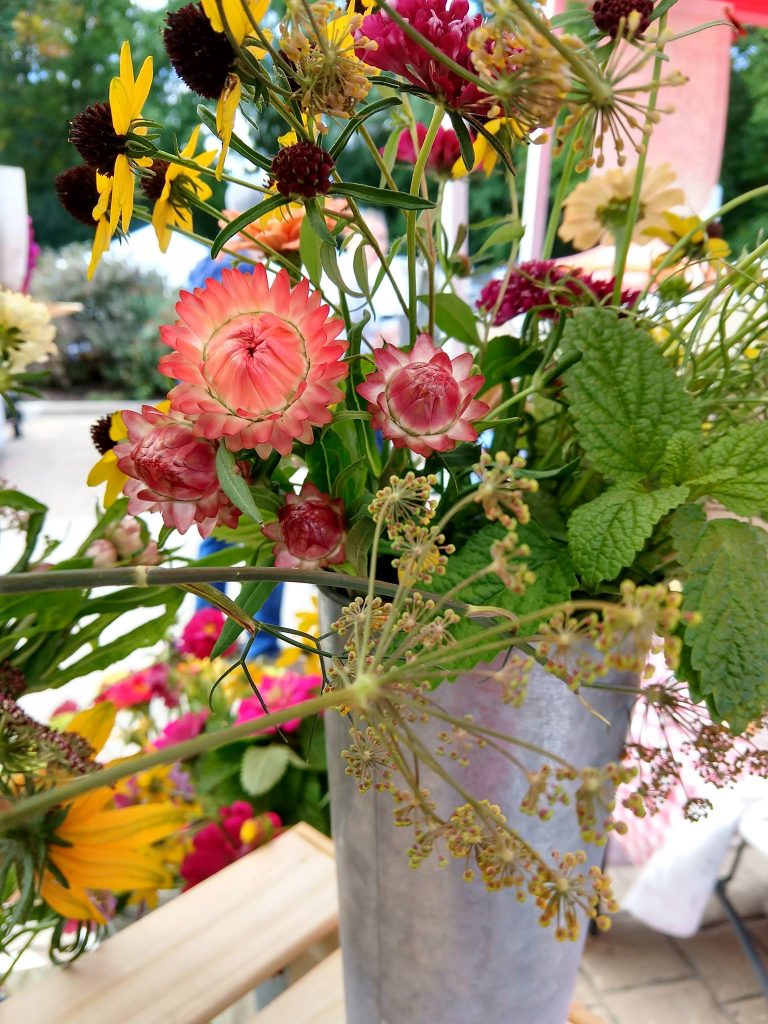
Written by Hippo (a hippopotamus) and Al (a bird)
These lovely flowers are from Aromatic Acres, a chemical-free urban garden located in Wauwatosa, Wisconsin. Using regenerative growing practices – no tractors polluting the air and disrupting the soil, no fertilizer runoff, no harm to neighbors and downstream communities – they protect the balance of life.
Al and I have been eyeing the bouquets . . .
“You’ve been positively drooling over them, Hippo,” said Al, “and in some cases, taking a bite!”
“Well, yes, Al,” I admitted. “I may have drooled a little. They are exquisite flowers AND, I added, since there are no pesticide residues, why not take a bite or two?”
“That means that birds can safely visit the garden,” said Al.
“Right, Al. Birds nest amidst the flowers! And bees and butterflies and humans, too,” I said.
“Hippo,” said Al, pecking me on the head, “humans don’t have nests!”
“That’s not what I meant, Al!” I said with some irritation. Then I saw his beak twitching and knew that he was just tormenting me.
As I started to say before, we’ve been eyeing their flowers at the Tosa Farmers Market. We’ve purchased a few small bouquets, or posies, as they call them – I love that word – and Carly, one of the humans who grows the flowers, told us that they sell buckets full of bulk seasonal botanicals that you can make into arrangements yourself for weddings and such.
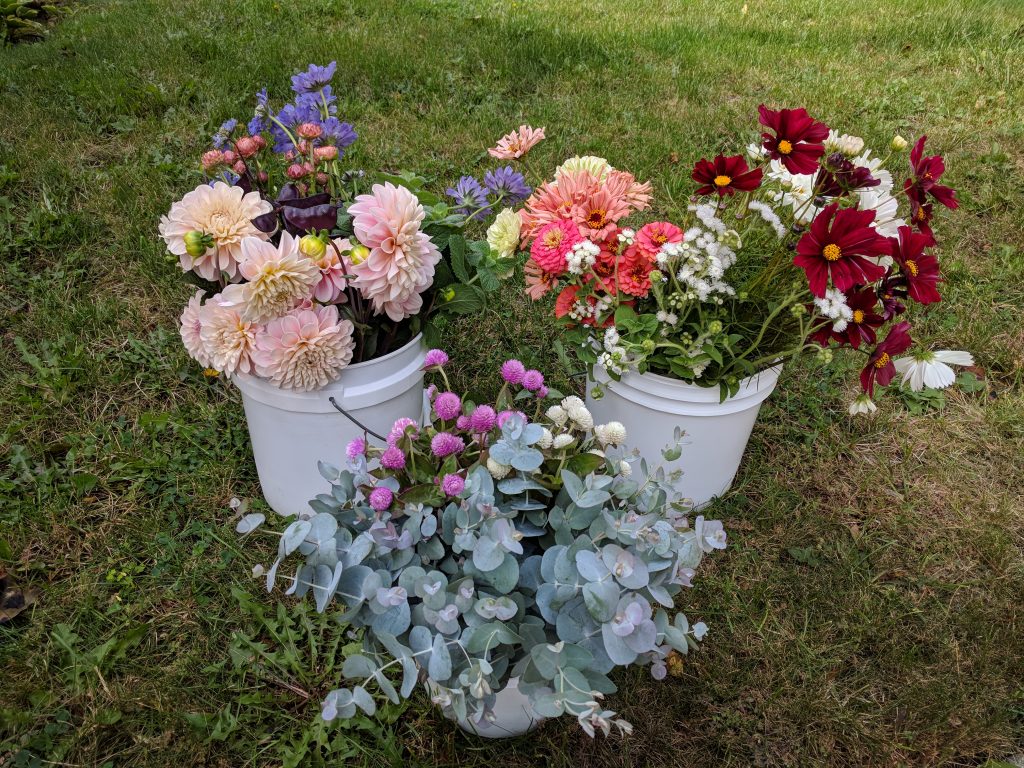
So when Al and I had a special occasion to host, choosing Aromatic Acres to prettify our tables was a no-brainer. We got some buckets of seasonal flowers – really pretty ones like zinnias and cosmos, and tasty ones like apple mint – and had great fun arguing about where to put the purple one and how long the stem should be and how many blooms should go in the vase. As it turned out, the beauty of nature’s colors and shapes more than compensated for our lack of arranging experience. Several of our guests exclaimed over the wonderful, wild look.
If you would prefer a professional floral artist, Aromatic Acres also supplies local shops like Wood Violet, located in Wauwatosa: Floral Alchemy, in Milwaukee; Bird and Bumble, in Elm Grove: and La Tulipe, serving Milwaukee’s North Shore areas. These shops are environmentally thoughtful.
“Hippo,” said Al, “you need to tell them the bad news too.”
“There is no bad news, Al.”
“Not about Aromatic Acres,” said Al. “You have to tell them about the industrial cut flower business.”
“I suppose I do, Al,” I said, reluctantly. “I get so tired of bad news, but I guess they need to know.”
First of all, most commercially-grown flowers come from Africa and South America due to cheap labor and favorable climate. But the big consumer markets are the United States and Japan. That means long, long distance travel. In order to keep the flowers looking fresh, they need to be transported under refrigeration; that means during trucking to and from the airports as well as during air travel. Refrigerated trucks use about 25% more fuel than those that are non-refrigerated. Flowerpetal.com reports that sending the roughly 100 million roses of a typical Valentine’s Day produces some 9,000 metric tons of carbon dioxide (CO2) emissions from field to U.S. florist.
“Indefensible!” said Al.
Because flowers are not considered food crops, there is no limit to the amount of pesticides that can be used in their growth. They are sprayed heavily throughout their growing season with insecticides, pesticides and fungicides – and again prior to shipment. After all, the US has strict customs inspections to prevent foreign fungal and insect infestations.
“Just look at this table showing the harm these chemicals can cause humans,” said Al. “Just think about the farmers growing these flowers, and the florists touching them every day.”
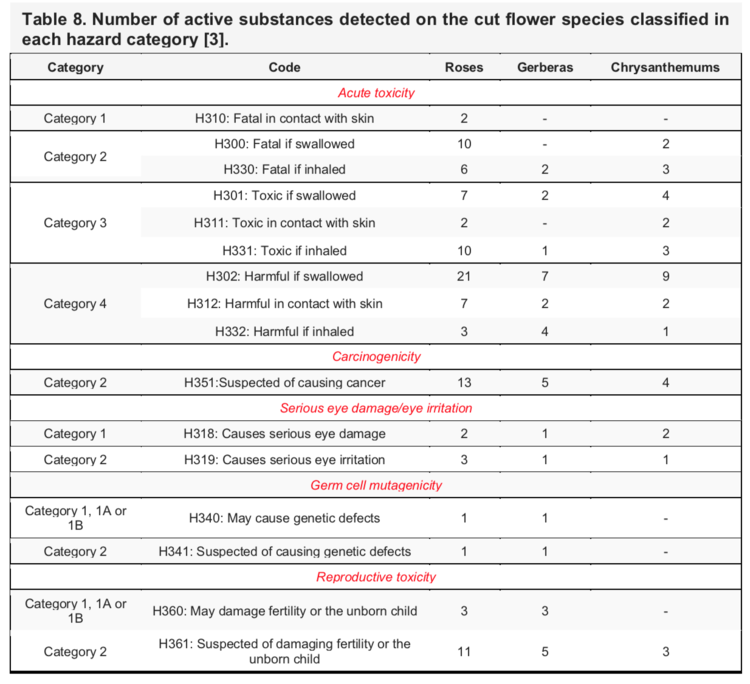
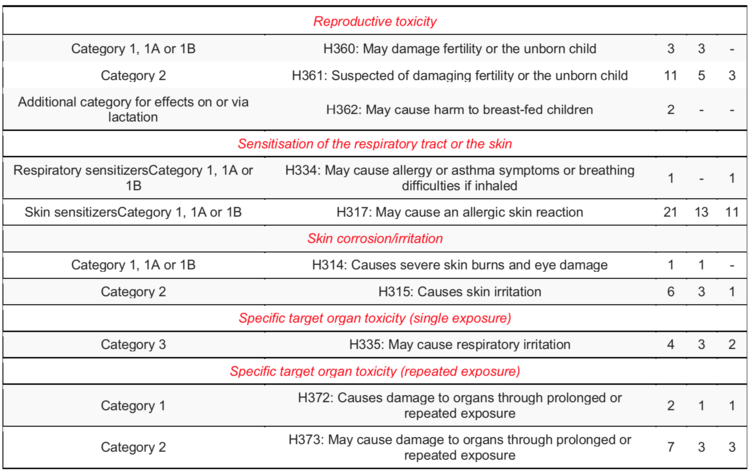
“But don’t take my word for it. Look at the studies. They show that most active substances tested reached concentrations approximately 1000 times above the maximum limit set for food.”
Toumi K, Vleminckx C, van Loco J, Schiffers B. “Pesticide Residues on Three Cut Flower Species and Potential Exposure of Florists in Belgium.” International Journal of Environmental Research and Public Health 2016; 13, 943.
Toumi K, Vleminckx C, van Loco J, Schiffers B. “Risk Assessment of Florists Exposed to Pesticide Residues Through Handling of Flowers and Preparing Bouquets.” International Journal of Environmental Research and Public Health 2017; 14, 526.
It should go without saying that these pesticides disrupt entire ecosystems upon which we all depend for life.
“And that’s all the bad news I can handle for one day, Al.”
“But what about the intense irrigation needed to grow all those miles of neat rows of flowers, Hippo? Don’t you remember the dried-up watering holes on the savanna? And Africa is one of the biggest flower growers in the world!”
“Sorry, Al. All that bad news is bad for the brain and I think they know enough now not to give their mothers roses from Africa on Mothers’ Day. Let’s end with some good news so our readers aren’t depressed for the rest of the day.”
Good News!
The best part of our job is meeting humans like Carly and Joe Ledger, the creators and farmers at Aromatic Acres.
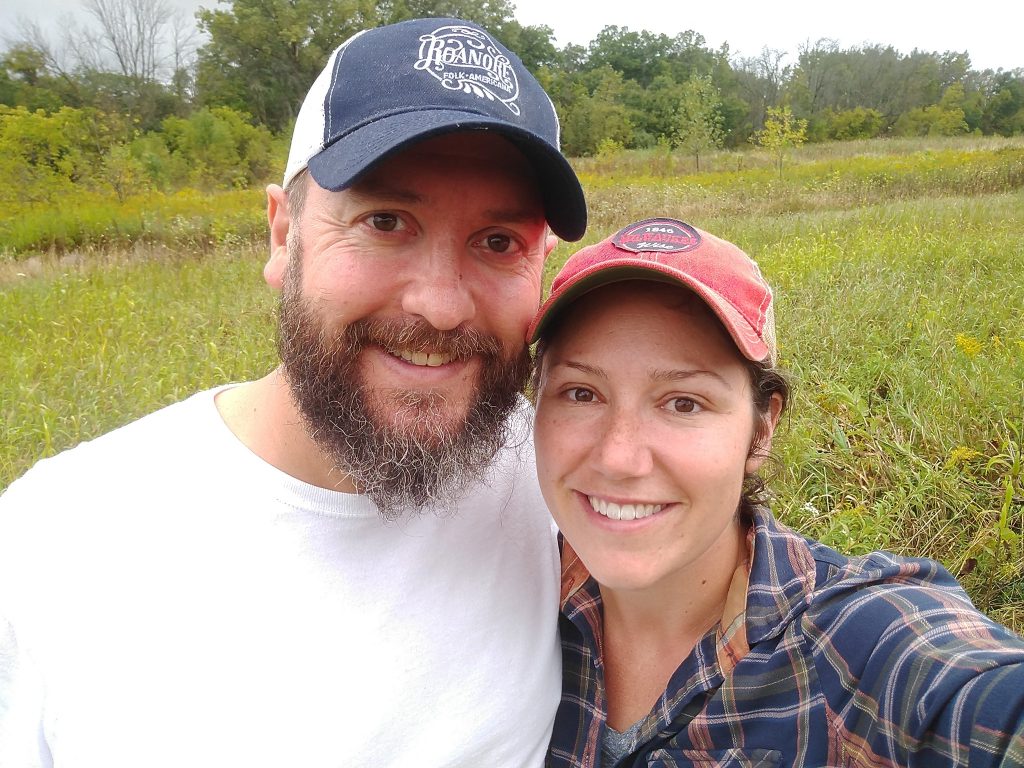
Here is how they live their lives:
Each day we choose our values.
We choose beauty.
We choose moments.
We choose our health.
We choose our community.
Most importantly, we CHOOSE JOY.
Help us make a better world. Please choose to buy your flowers from humans like Carly and Joe.
Aromatic Acres
414.436.4769
aromatic acres.com
Have you read The True Adventures of Hippo and Al yet? It’s an exciting tale filled with undercover disguises, menacing giants, and feats of great bravery . . . “by me,” said Al – “the bravery part, that is.” Read it here.

